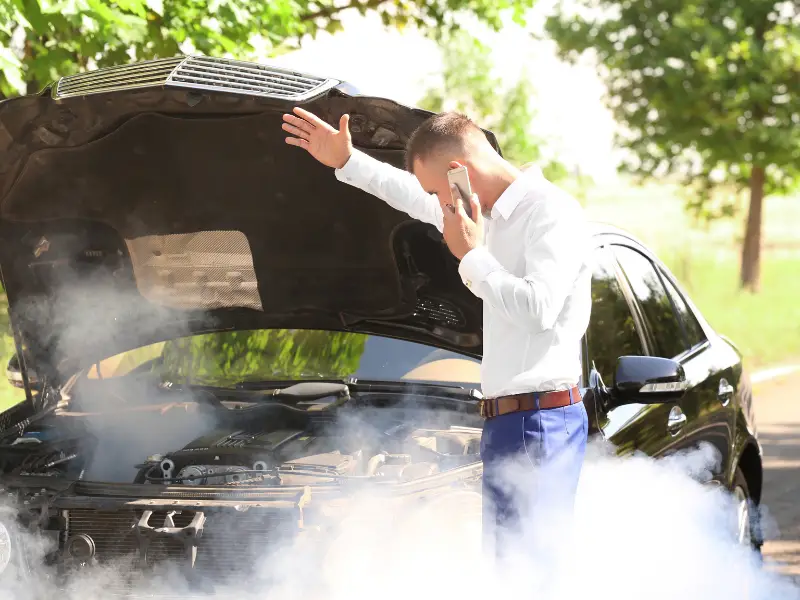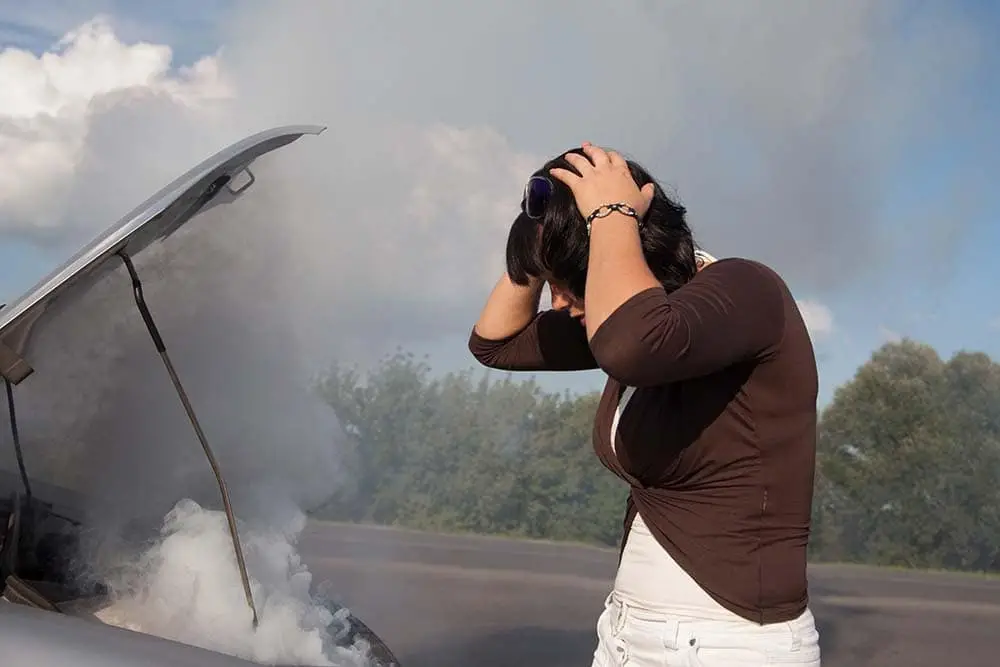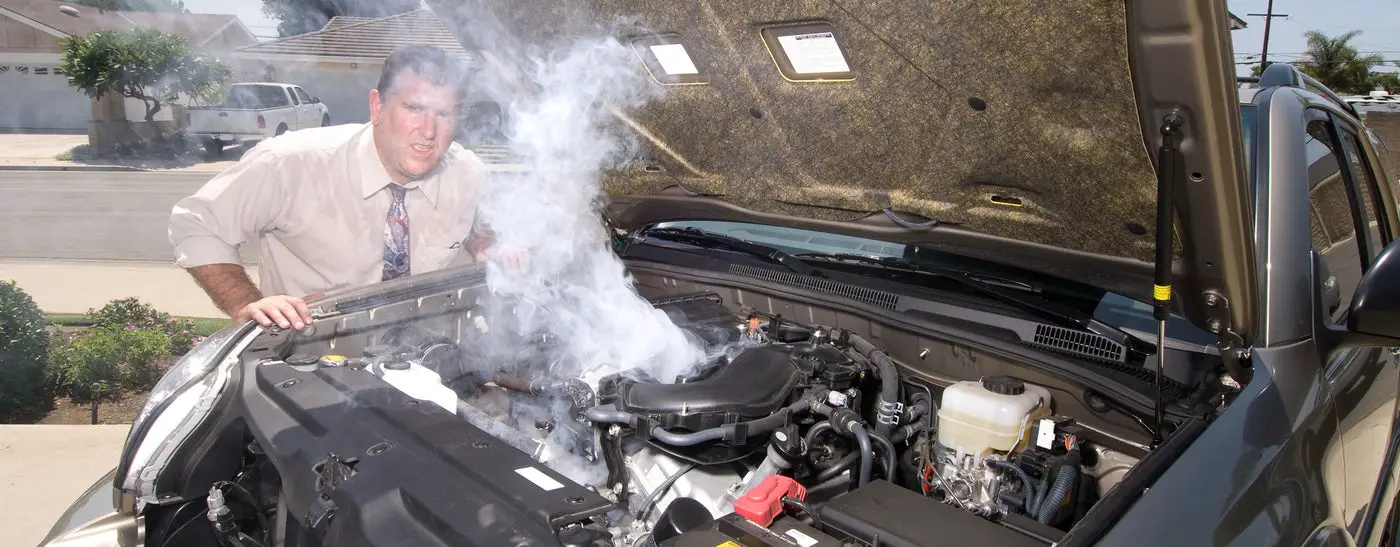What Happens When My Car Overheats
Engines have an optimal operating temperature that needs to be maintained by the cooling system. At start up, especially on cold days, some engines may need to warm up a little, but with an effective cooling system, should remain steady. The radiator fan and liquid cooling system ensure that, when under strain, the temperature doesn’t climb too high. If the components of the cooling system are working at maximum capacity for extended periods of time, it may struggle to keep up. When it can no longer keep up, the engine will become hotter until it overheats – this implies that, firstly, the coolant overheats or boils, and secondly, the metal of the engine itself gets too hot and can actually meld together. As the coolant boils and releases vapor, it expands and, with nowhere to go, can cause serious damage to your engine.
Q: Please Dont Say Its A Head Gasket
A: Sorry to burst your bubble, but it might be. Here are a few symptoms of a blown head gasket, pay close attention to the last one.
Overheating
If a head gasket blows, even slightly, the engine might overheat and damage several components. One thing you should never do when your car is overheating: Remove the radiator cap and check the coolant. Thats how you punch a one-way ticket to the ER for a scalded face.
Milky Oil
If you notice milky colors in your oil, you might have a blown gasketthe underside of your cars oil reservoir cap will likely become splattered with the milky oil. This happens when coolant comes in contact with and contaminates the oil.
Bubbling Inside Radiator
If you notice bubbling inside the radiator or coolant reservoir, its an indication your system has air in it, which could be caused by a leaking or blown head gasket.
How Long Does It Take For A Car To Cool Down After Overheating
It takes at least 30 minutes for an overheated engine to cool down to the point where it is safe to inspect and possibly work on it but that is under normal condition. It is critical to remember that because the engine itself, the radiator and coolant are all scalding hot during the initial cooling process. And if you dont wait for 30 minutes, you risk serious injury if you do not wait until the engine cools down before performing an inspection and attempting to resolve the problem.
Heat reduction is proportional to the temperature difference between the surrounding environment and the engine when the engine is turned off and the car is stationary. When the engine cools down close to the surrounding air temperature, the amount of convection cooling decreases significantly, which is why it takes several hours for an engine to cool to the ambient temperature.
Engines with aluminum blocks typically cool much faster than engines with cast iron blocks however, aluminum blocks and heads are more prone to heat damage than iron blocks and heads. Open the hood to increase air circulation within the engine bay to speed up initial cooling.
Don’t Miss: Substitute For Car Soap
What Happens When An Engine Overheats
Todays engines are typically built to be durable, but when heat generated by a vehicles motor is well above the normal operating temperature, the devices made to cool this heat distribution may begin to fail, potentially causing permanent damage to not only the engine, but also the gaskets, hoses and seals that are designed to keep the engine running.
There are a variety of reasons that a vehicle can overheat, such as cooling system leaks, blocked hoses from corrosion and mineral deposits, radiator issues or broken water pumps. Regular inspections may help avoid overheating issues down the road.
Come in today for a consultation on your coolant/antifreeze fluid.
Symptoms Of Engine Damage From Overheating

The internal combustion engine in your automobile contains a number of moving parts and components, which generates friction when some of these parts rub against one other. In this post, well look at some typical Symptoms of Engine Damage from Overheating, as well as how long a car may overheat before breaking down.
Lets start there. Can an automobile overheat for an extended period of time before it causes damage?
When your automobile begins to overheat, you will have anything from 1 minute to 5 minutes before the engine fully fails. Some issues may have already begun in the first 30 to 60 seconds. This might utterly destroy the cars engine!
You May Like: Can You Lease A Car From Carvana
What To Do When Your Car Is Overheating
-
Dont ignore signs of overheating it could cause serious engine damage
-
Stop somewhere safe as soon as you can
-
Dont open the bonnet wait for the NRMA while the engine cools
The first sign your cars engine is overheating is usually the needle on the temperature gauge rising towards the red zone, or the check engine or temperature warning light on your dashboard illuminating.
Keep in mind that even if you don’t suspect your vehicle has overheated or the needle on your gauge has not risen, it’s never a good idea to open the bonnet or remove the radiator cap after driving as it can cause serious injury.
Coolant in the radiator is extremely hot and will eventually boil and steam will rise from under the bonnet if the car has overheated. If this happens to you, stay safe by following these three simple steps from the NRMA:
Damaged Or Blown Head Gasket
Engines have a main seal that fits perfectly between the engine block and the cylinder head.
There would be no way the engine could run without it. Oil and coolant would pour everywhere and the engine will lose compression in the cylinders as soon as the vehicle was started.
In addition to leaking, oil and coolant get contaminated when the head gasket fails. This is because the gasket acts as a barrier between the liquids and the engine block channels through which they travel.
Persistent overheating is one of the symptoms of this problem.
However, the most obvious sign is the presence of a foamy material within the coolant reservoir. This is the consequence of the engine oil and coolant mixing together.
The issue will get worse with time if you continue to drive at the current degree of overheating.
When it comes to this repair, it will cost you a lot of money since youll have to open the engine. Youll simply end up incurring extra costs if you put off this repair any longer.
Make sure to get a repair estimate if youre driving a pre-owned vehicle. There are many situations when the repair is not worth the effort.
Recommended Reading: Arizona Title Transfer Without Notary
Prevention Is Better Than Cure
Most car engines’ cooling-system problems can be avoided through preventative maintenance. Have your vehicle serviced regularly, have the cooling system inspected frequently, and always make sure that you replace tired pipes, attend to leaks in short order, and always ensure that the prescribed mixture of anti-freeze and water is used. Check your coolant level regularly on a cold engine, first thing in the morning, and keep an eye out for coolant leaks on the floor. There may be so many reasons why a car engine is overheating, so stay a few steps ahead by pre-empting them. One thing is for certain, car-engine overheating problems don’t just go away when you ignore them. The sooner you find the solutions, the less damage you will suffer.
What You Should Do If Your Cars Engine Overheats
Here are some steps to follow if your cars engine overheats:
To optimize your cars engine life, always avoid driving with an overheated engine. Be sure to remain vigilant at all times for signs that your car is overheating so you can handle the situation safely if it comes up.
Check out all the engine cooling system products available on NAPA Online, or trust one of our 17,000 NAPA AutoCare locations for routine maintenance and repairs. For more information on what to do if your car is overheating, chat with a knowledgeable expert at your local NAPA AUTO PARTS store.
Photos courtesy of Pexels.
Read Also: Synchrony Gas Credit Cards
How To Prevent Your Car Engine From Overheating
Dealing with an engine thats overheating can feel like flirting with disaster and something you want to avoid at all costs. To prevent your car from overheating, regular car maintenance is key. You can:
- Maintain coolant levels
- Do regular radiator check-ups
- Perform routine car inspections
Maintenance can lead to prevention, which is always easier and more cost-effective compared to treating an issue.
Pull Over At A Safe Place
Driving a car when it is overheating can cause serious damage to your engine therefore, it is best to find a safe place and pull over as soon as possible. Once you pull over a vehicle, allow it to cool for at least 15 minutes. Keep all your attention to the temperature gauge, if it is moving back to the normal range or not. Do not lift the bonnet or touch the engine unless you see the temperature dropping to a normal level.
Recommended Reading: Car Making Squealing Noise When Driving Stops When Braking
Should I Have An Emergency Car Overheating Kit
Yes, absolutely. Its always better to have it so that it can act as first aid. This will help you get to the nearest car care facility to get the proper fix. Youll need these items if your cars engine begins to overheat:
- Standard hand tools in a compact case
- Several gallons of gasoline
- Thick-knit gloves
What To Do If Car Engine Overheats

Whats the worst nightmare of every car driver? Its most probably getting stranded on the road due to an overheated engine. With modern cars, engine overheating is not a regular occurrence. However, if your car engine overheats, do you know how to manage such a situation?
While it might be tempting to ignore it and keep on driving, but dont do that unless youre fine risking complete engine rebuild. Heres what you should do for dealing with overheating engine:
1) Get off the road and park in a safe spot because it will take some time to troubleshoot it. You dont want to be parked in a dangerous spot where a vehicle might hit you.
2) Do not open the bonnet until few minutes. Let the engine cool down a bit before you start messing around the engine bay. Whats worst than the overheated engine? Getting burnt face if the hot coolant splashes on you.
You May Like: Can You Lease With Carvana
Common Problems That Cause Overheating
Common problems that cause a car engine to overheat include:
Steam From The Car Hood
The simplest technique to identify if your cars engine is too hot or too cold is to use steam. When the coolant in the coolant reservoir becomes heated, a large amount of steam is produced.
It is possible that the coolant is not moving correctly, or that the radiator cap has cracked or is loose.
The coolant begins to boil and produce steam as the engine heats up. You cant get very far at this speed.
Because steam is coming out of your hood, you should stop driving right away to avoid internal mechanical problems and figure out whats causing these problems, so you can figure out whats wrong. Getting your car towed may be the only way you can have it fixed.
Don’t Miss: Remove Scuff Marks From Car Interior
What To Do If Youre In Traffic
Being stuck in a nasty jam with a car beginning to show signs of overheating is a pretty unpleasant scenario. You can make the best out of the situation, however, and possibly save your car a lot of damage, if youre alert to the warning signs and respond swiftly. If youre in non-moving, gridlocked traffic, put your car in neutral or park and rev the engine. This technique is designed to encourage water and air flow through your radiator, helping to cool the engine down. If youre in stop-and-go traffic, alternatively, try to creep forwards rather than move jaggedly in fits and starts of braking and accelerating, which is important because braking generates a lot of friction, which will only exacerbates the problem. Remember, when you get to a safe place to stop, turn off the engine, pop the hood, and wait.
Loved this article? Like or share!
The above information is for reference only. Kwiksure takes no responsibility for the accuracy and timeliness of the information. For the coverage, mode of compensation, benefit limit and premium levels of any specific insurance plan, please refer to the relevant policy terms.
Be Prepared On The Road
Your car overheating isnt the only problem you might face on the road. Every time you pull out of your driveway, you should be prepared for potential issues. The right car insurance can help protect you from the costs of unexpected incidents. For example, if you accidentally run into another vehicle because your car is overheating, your car insurance could help cover the costs to repair the other car. Talk to your Wawanesa agent today to make sure you have the right coverage for your vehicle.
Don’t Miss: Can Clear Coat Be Repaired
Why Does A Car Overheat
A car engine can overheat for several reasons, which we list below, but in most cases, it is due to low engine coolant level or because a component or sensor of the cooling system has failed. Once the cooling system fails and the coolant no longer moves through the engine, the engine can no longer be cooled down.
Why Do Engines Overheat
Engines can overheat for many reasons. In general, it’s because something’s wrong within the cooling system and heat isn’t able to escape the engine compartment. The source of the issue could include a cooling system leak, faulty radiator fan, broken water pump, or clogged coolant hose.
Regardless of the problem’s source, an overheating engine isn’t something you want to let linger. Your engine could sustain serious, if not permanent, damage.
Recommended Reading: What Do Car Salesmen Make On Commission
Drive To The Nearest Garage
If adding coolant doesnt help then, drive to the nearest garage if possible. Trained professionals will inspect your vehicle and solve the issue after proper diagnosis. Search the web and you might find the best car service deals in Dubai to get hassle-free professional assistance within budget.
If your car overheats frequently despite repairs, then maybe it is time to replace it with a car in better condition. For this purpose, check the listings of used cars for sale in the UAE at dubizzle and find a range of options:
How Do You Cool Down An Overheated Car

If your car overheats, don’t panic. There are steps you can take to cool down an overheated engine. First, although it may sound counterintuitive, turn off the A/C and crank the heat to the highest setting. This allows for even distribution of heat throughout the car rather than it being stuck in the engine bay. Second, find a safe place to pull over and shut off your car. Allow your engine to cool for at least 15 minutes and keep an eye on the temperature gauge. You don’t want to keep driving with an overheated engine as this could cause significantly more damage to the engine if pushed too far. Next, make sure that you have enough coolant and top it up if needed. Lastly, restart your car and drive to your nearest repair shop. There is most likely a problem with a cooling component and our parts centre can provide you with the right piece.
Recommended Reading: Who Owns Avis
Kill The A/c And Crank The Heat
Immediately turn off the air conditioner to reduce stress on the engine. Then, turn the dial to maximum heat. This can help pull heat away from the engine to keep it from overheating until you can pull over in a safe location. You may get a little hot yourself, but a few minutes of discomfort is a small price to pay compared to major engine repairs.
What To Do If Your Car Overheats: 5 Must
When the mercury begins to rise outside, its common for car engines to get overly toasty too. Thankfully, there are plenty of things you can do to make sure a temporary jump in temperature doesnt lead to long-lasting trouble. To help you know what to do if your car overheats, here are 5 easy steps.
You May Like: How To Fix Clear Coat
